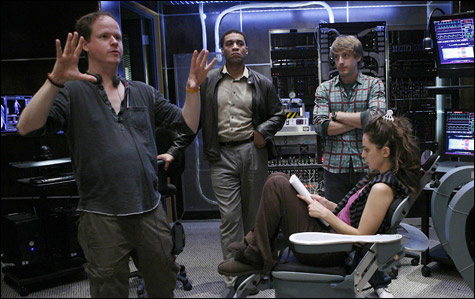
Whedon (left) on the set of Dollhouse with Harry Lennix, Fran Kranz, and Eliza Dushku. |
When I first reach Joss Whedon — the director, writer, and producer who is perhaps best known as the creator of Buffy the Vampire Slayer — at his office at Fox Studios in Los Angeles, it's about 9 am his time, and it sounds as if I'd caught him before his coffee had kicked in. But as soon as we start discussing his new psychodrama series Dollhouse, the specifics of how the Firefly cancellation broke his heart, and the "dance on hot coals" that comes with writing for a character with a fluid identity, the morning's woes seem to disappear.InDollhouse, your heroine, Echo, regularly takes on new personas and then has all of her character traits wiped. Do you feel that the premise of the show is something that's been brewing in the zeitgeist?
If it hasn't, I'm probably in horrible shape. That's sort of the point. The things that interest me are an amalgam of the things happening around me, and the things I've been enjoying. Everyone had a different theory of what the show was, and everyone is always right, because you're taking from the things you care about. Everything is about identity. Identity is very interesting to me, because I think it's a lot more amorphous than people give it credit for. Tolstoy was saying this in Resurrection: "Human beings are like rivers: the water is one and the same in all of them, but every river is narrow in some places, flows swifter in others." And I believe that's the case, that we're all completely changeable. We're all made up of influences we could not control but that are innate within us. Who we are and what we are is a thread that's always going to be popular, but it will always find different voices.
Did you worry that it might be a bit difficult for your audience to root for a character who, by virtue of the show's conceit, has a constantly shifting personality?
It makes it harder for us to write for Echo, so I do think it's harder to root for Echo. It's a very tricky thing. It makes it easy because you're interested in what she's doing next. Every week we come in going, "Where is the part where they understand it's truly her, and how much will they care about the part that's been manufactured?" That's part of the dance on hot coals.
Strong, smart, female characters who are trying to find themselves are obviously important to you. But Echo seems nothing like Buffy — except for the ass-kicking abilities.
If you're going to study strength, you have to study weakness. Here's a person who is at the mercy of the people around her, but she developed the concept of identity and emancipation with a brain that's not supposed to do these things. It's about finding a voice in the most deafening silence. Sometimes she's enormously strong, and we can see that. At the same time, the person inside the Dollhouse is so insouciant. Some people said, "This isn't what you do!" But I wanted to be able to look at it from that angle.
 Related
Related:
Review: Dollhouse, Review: Honey West, More than Mormons, More 
- Review: Dollhouse
Joss Whedon continues to fight the darkness
- Review: Honey West
I didn't see Honey West during its one-season, 1965-'66 prime-time run on CBS.
- More than Mormons
Despite the comparably juicy family dysfunction it offers, Big Love hasn't achieved the iconic status of its HBO predecessor The Sopranos . Maybe viewers relate better to the mob than to Mormons.
- Miss perfect
I know what you're thinking: " Another Emma ? Didn't we just have a bushel of Jane Austen adaptations for TV?" Well, WGBH did give us four new Austens, but that was all the way back in 2008, a Jane-ite eternity.
- Lonely island
This Tuesday, the sixth and final season of Lost will launch onto home screens (ABC; February 2 at 9 pm). When the show last left us, you'll recall, it appeared to have killed off one of the Island's main string pullers, Jacob (Mark Pellegrino), in 2007 while simultaneously detonating a nuclear bomb underneath the Island in 1977.
- Interview: Will Arnett
When it went off the air, in 2006, Arrested Development had already cemented its status as one of the great TV comedies of all time.
- Interview: Eloise Mumford and James Wolk of Lone Star
James Wolk and Eloise Mumford, the stars of Fox's new drama Lone Star [premiering Sept. 20) are both far more attractive in person than they are on the TV screen.
- Web hits Quiet Desperation and Karmaloop are turning Boston into must-see TV
In Boston, there are two nascent examples of Web-video projects getting flipped into legitimate TV deals.
- Dexter — still bloody good
When we saw Dexter last, his sister Deb had walked in just as he plunged a knife into Travis Marshall's chest.
- Homeland's victory lap
Is there a more compelling spectacle in television these days than Claire Danes slowly decompensating into full-on mania?
- Boxes for the Box: DVD sets for the holidays
Call us homebodies, call us lazy, but the plain fact is that most nights we're more than happy to stay at home on the couch in ratty sweats, cozied up to a box of wine.
- Less

 Topics
Topics:
Television
, Television, Joss Whedon, Joss Whedon, More  , Television, Joss Whedon, Joss Whedon, Serenity, Fox, Eliza Dushku, Dollhouse, TV shows, Firefly, Dr. Horrible's Sing-Along Blog, Less
, Television, Joss Whedon, Joss Whedon, Serenity, Fox, Eliza Dushku, Dollhouse, TV shows, Firefly, Dr. Horrible's Sing-Along Blog, Less 